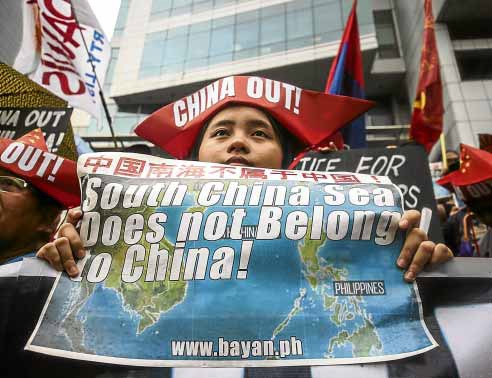
COURAGE VS CHINA Militant groups rally in front of the Chinese Consulate inMakati City, during the Philippines’ celebration of Independence Day last June 12 to demand that China leave Philippine territory alone. —EARVIN PERIAS
Malacañang admitted that attempts by the military to verify reports about the presence of Chinese weather monitoring stations in the disputed Spratly Islands might end up provoking “something that we don’t want.”
At a press briefing, presidential spokesperson Salvador Panelo said verifying an admission made by the Chinese government that it had built weather stations in the Spratlys would require the Philippine military to enter the area.
“You need to go inside the territory that this particular country claims that it’s theirs,” Panelo said at the briefing on Tuesday.
“So you may have some problems there,” he said.
Xi warning
“It may even provoke something that we don’t want,” said Panelo.
Panelo did not say what could be provoked, but President Rodrigo Duterte had repeatedly revealed publicly that Chinese leader Xi Jinping had warned him of war if the Philippines became assertive in its claims in the Spratlys.
Panelo made the comment when asked for Malacañang’s reaction to a statement attributed to Defense Secretary Delfin Lorenzana.
Lorenzana had said the Philippine military was unable to verify the existence of the Chinese weather monitoring stations, which were confirmed last month by the Chinese foreign ministry.
According to Lorenzana, although the Philippine military flew planes near areas reclaimed by China in the Spratlys, these aircraft always got warnings from Chinese troops.
Who will enforce?
Panelo said even with the international arbitral ruling favoring the Philippines, China had consistently claimed virtually the entire South China Sea to be its territory.
“They claim that it’s theirs, but the arbitral ruling says it’s ours,” Panelo said.
“Meanwhile, nobody seems to want to enforce it,” he said.
Panelo added that this was the reason for the Philippines’ decision not to assert the arbitral ruling and instead pursue closer relations with China.
“That’s precisely why we are using the mechanism of diplomacy and negotiation,” Panelo said.
Critics of the Duterte administration accused its officials of virtually abandoning the Philippines’ territorial claims in exchange for Chinese funding of projects listed in Mr. Duterte’s ambitious “Build, Build, Build” program.
The President himself had repeatedly said he needed China’s help for infrastructure projects that would cost billions of pesos and which the Philippine government could ill afford without assistance from China.

